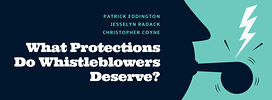Lead Essay
Patrick G. Eddington argues that we need stronger legal protections for those who expose federal wrongdoing. He starts with Greek ideals about democratic governance, and with the American Revolution, which saw what might be called the first U.S. whistleblower statute. He argues that today’s protections are insufficient, and he recommends a set of improvements for intelligence community whistleblowers in particular.
Response Essays
Jesselyn Radack writes that the Intelligence Community Whistleblower Protection Act (ICWPA) is purposefully harmful to those whom it supposedly protects. Because it sets up the Director of National Intelligence as a gatekeeper for whistleblower complaints, the executive branch wins a chance to review and possibly silence any possible complaints. She also condemns the recent uses of the Espionage Act as particularly dangerous for those who expose federal intelligence wrongdoings.
When the law doesn’t protect whistleblowers, sometimes the only choice left is to take the complaint to the public. Christopher J. Coyne looks at the role that whistleblowers play in democratic governance and how taking a complaint public might—but also might not—bring justice.
The Conversation
Coming Up
Discussion through the end of the month.
Related at Cato
Conference: Cato 2019 Surveillance Conference, December 6, 2019
Cato Unbound: “The Snowden Files: One Year Later,” June 2014
Book Forum: Crisis of Conscience: Whistleblowing in an Age of Fraud, October 2, 2019

